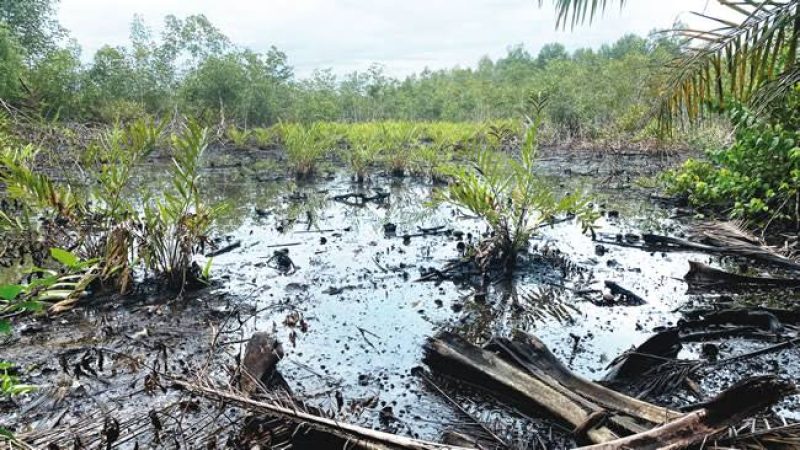Some groups of environmental activists have charged the President Bola Ahmed Tinubu-led government to act swiftly in order to avert what they described as ‘environmental genocide’ in the oil-rich, but now oil-devastated Niger Delta region of the country.
They stated at a media conference during which they made a strong case for cleaning up of the Niger Delta and resolving the prevailing environmental genocide to enable Nigerians to live in a society that boasts of peace, human security and prosperity in the conviction that all citizens and public officers have a duty to make constructive contribution towards their well being.
Speaking at the media briefing, which was held under the auspices of the Coalition for a Cleaned Niger Delta (CCND), Executive Director, Health of Mother Earth Foundation (HOMEF), Dr. Nnimmo Bassey and Founding Executive Director, African Centre for Leadership, Strategy and Development (Centre LSD), Otive Igbuzor, specifically appealed to the President to uphold his sworn commitment to national renewal by galvanizing swift action to resolve the looming ecocide in the Niger Delta.
“The current situation increasingly threatens the continued existence of the region, undercuts the full economic potential of our country and constantly hangs national security on high risk levels.
“We trust our president is aware that the Niger Delta ecosystem has for about 70 years been plagued by unprecedented perennial pollution from petroleum production activities, enabled or worsened by a highly dysfunctional, conflicted and compromised environmental regulatory system, since the country struck commercial oil in the Oloibiri Province prior to Nigeria’s Independence.
“This festering devastation has projected and ranked Nigeria’s Niger Delta among the worst oil and gas polluted regions in the world,” they stated.
They lamented the limited official records of Nigeria’s spill by the National Oil Spill Detection and Response Agency (NOSDRA), adding that there were 16,263 oil spills in 17 years from 2006 to 2023, which accounted for about 823,483 barrels of oil spilt, equivalent to 4,103 tanker trucks or 130,933,797 litres of crude oil from NOSDRA data.
“These figures are a fraction of the reality, as they exclude 5,456 spills for which the spilling companies did not provide NOSDRA with estimates of spilled quantities. Besides, estimates are usually and “understandably” grossly suppressed by operators. Data for some mega spills, like the Aiteo blowout at OML 29 that lasted for 38 days between November and December 2021, are also omitted.
Read Also: Implementation of Bishops’ report, panacea for peace in Ohanaeze- lsiguzoro
“Furthermore, NOSDRA’s conservative spill statistics cited above do not include data for all of 50 years from 1956 when Oloibiri Well 1 was spudded, till 2006 when NOSDRA was created. We also omitted gas volumes flared continually for 68 years and the equally deleterious millions of barrels of toxic effluents discharged untreated into the rivers, swamps and mangroves as waste in the course of production.
“If allowance is made for these omissions and non-disclosures, easily one billion litres of crude oil equivalent have been released into the Niger Delta ecosystem as the price paid by communities there for Nigeria’s oil production,” they added.
They also cited the ecological destruction of the region from petroleum extraction, including the 2011 United Nations (UNEP) Environmental Assessment of Ogoniland, United Nations Development Programme (UNDP) Report on Biodiversity in the Niger Delta, reports by the International Union for Conservation of Nature (commissioned by Shell), the 1997 Niger Delta Environmental Survey (also commissioned by Shell), reports by Amnesty International (AI) and Friends of the Earth, and studies conducted by Bayelsa, Rivers, Akwa Ibom, Cross River, Edo and Delta (BRACED) Commission, among others.
Also lamenting the failure of past presidents, petroleum and environment ministers and chief regulators to recognize the indescribable gravity of the ravage, its severe socio-economic and security repercussions for Nigeria and to comprehensively resolve it, they appealed to the President to visit the region, along with the relevant Ministers and Regulators and possibly the National Security Adviser (NSA).
Some of the locations are Polobubo and Ogulagha in Delta State; Ibeno, Mbo and Ikot Ada Udo in Akwa Ibom State; Awoye in Ondo State; Bille, Obagi and Rumuekpe in Rivers State; and Gbarain/Ekpetiama, Nembe, Aghoro and Otuabagi in Bayelsa State.
They recommended that to resolve the environmental crisis and create an unprecedented legacy in the Niger Delta and Nigeria in general, the President should Issue an Executive Order on the creation of a Niger Delta Environmental Remediation Programme and Trust Fund.
“This can be either independent of or domiciled in the extant Hydrocarbon Pollution Remediation Project (HYPREP) currently overseeing the cleanup of Ogoni Land, but with a separate Trust Fund from the Ogoni Trust Fund, an expanded Governing Council and an unimpeachable management system designed to avoid the contradictions that have historically bedeviled HYPREP and the debatable progress of the Ogoni Cleanup. The tasks of the Programme would include a definitive health audit besides the standard environmental audit of impacted areas,” they said.
They also recommended the adoption of National Principles on Divestment and Decommissioning in the oil industry in line with the one recently compiled by a coalition of community, civil society and international organizations, following extensive field missions and engagements in the Niger Delta.
On the solution to oil theft and assets vandalism, they said: “To avoid or minimize re-pollution, optimize production and abate associated insecurity, enact a carefully articulated approach to this economic crime (based on broad and in- depth stakeholder consultations, which we are prepared to be part of if required).
“The new strategy should be preventive, proactive, inclusive, accountable, and look beyond current official reliance on state and non-state military methods that can often be tragically counterproductive, as results have shown intermittently,” they stressed.






